Edie Melson's Blog, page 343
May 12, 2016
Become a Resilient Writer by Remembering These 15 Things
by Edie Melson @EdieMelson
 There is only one constant in the publishing industry—constant change.
There is only one constant in the publishing industry—constant change.
As soon as we think we’ve hit on the formula for success, the variables shift and we’re back to square one. It can set us up for a life of frustration if we’re not ready for it.
That’s what today’s post is about. I want you to have the tools and resources you need to set yourself up for success in an uncertain environment.Remember these 15 Things1. These sudden shifts are an opportunity, instead of a liability. For example, if the bottom drops out of the genre you’re writing with traditional publishers, look at the opportunities with smaller houses or self publishing.
2. We can use setbacks as a chance to deepen our knowledge of that particular subject. Early on in my career I had a Bible study rejected simply because I had no platform. I took that as an opportunity to earn to grow my online platform.
 When faced with rejection, turn it upside down.3. When faced with rejection, turn it upside down. When I first started as a freelance writer, I knew that if I received a certain number of rejections every month, then I get a certain number of acceptances. So I made my goal each month to reach a specific number of rejections.
When faced with rejection, turn it upside down.3. When faced with rejection, turn it upside down. When I first started as a freelance writer, I knew that if I received a certain number of rejections every month, then I get a certain number of acceptances. So I made my goal each month to reach a specific number of rejections.
4. Rejoice when others are successful. Sometimes that’s hard to do when things aren’t going our way, but when we can move past being resentful of another’s success, we’re able to cultivate contentment and resiliency.
5. We cannot give weight to those negative voices in our heads and survive. We say things to ourselves that we wouldn’t allow someone to say to our worst enemies. All writers have those negative whispers. The successful ones know to ignore them.
6. Promote others who write the same things as you. It sounds counterintuitive, but I’ve built my platform by promoting others ahead of myself.
 Comparison is a deadly trap to be avoided at all costs.7. Comparison is a deadly trap to be avoided at all costs. There are always going to be people ahead of us, behind us, and right beside us. We all have different gifts and God has a different—special—plan for us all. Comparison isn’t accurate and it can be deadly.
Comparison is a deadly trap to be avoided at all costs.7. Comparison is a deadly trap to be avoided at all costs. There are always going to be people ahead of us, behind us, and right beside us. We all have different gifts and God has a different—special—plan for us all. Comparison isn’t accurate and it can be deadly.
8. There truly is plenty of work to go around. We work for a big God and He has plans for this gift He’s given us.
9. Talent will often provide the push to begin writing, but it won’t fuel the journey. Talent is a wonderful thing, but it’s not a necessary thing. Persistence is what carries you through the tough times.
10. Never stop learning.This publishing thing we’re all doing is a journey. There isn’t an end destination. Every level we achieve just leads to another climb ahead. And those climbs can’t be done without additional knowledge.
 We cannot do this alone. (This is my critique group. We
We cannot do this alone. (This is my critique group. We
meet every week for several hours.)11. We cannot do this alone. We all need friends and colleagues on this writing journey. They give us perspective, encouragement and the occasional kick-in-the-pants we all need.
12. Remember the WHY to get through the HOW. When difficult times come, it’s the why that will carry us through. Write down why you write. Post it above your desk and let it remind you why you’re here.
13. We’re not responsible for the results, only the work. We can’t guarantee ourselves publication at any particular time or with any particular company. What we can do is write with excellence. If we do that, publicationwill follow.
14. We live in one of the best times ever to be a writer. It’s easy to look at all the changes and general chaos as nothing but negative. The truth is though, we can reach more people through our words than ever before. And anyone who wants to reach the world through words needs a writer to help them.
15. Prayer changes things. As Bob Hostetler and Lucinda Secrest McDowell have reminded us in previous posts, always pray before you write.
These are the things I’ve found that have made me a resilient writer. What would you add to the list? Be sure to leave your thoughts in the comments section below.
Don’t forget to join the conversation!Blessings,Edie
TWEETABLESBecome a Resilient Writer by Remembering These 15 Things -@EdieMelson (Click to Tweet)
“Talent will often provide the push to beginwriting, but it won’t fuel the journey” – @EdieMelson (Click toTweet)
 There is only one constant in the publishing industry—constant change.
There is only one constant in the publishing industry—constant change. As soon as we think we’ve hit on the formula for success, the variables shift and we’re back to square one. It can set us up for a life of frustration if we’re not ready for it.
That’s what today’s post is about. I want you to have the tools and resources you need to set yourself up for success in an uncertain environment.Remember these 15 Things1. These sudden shifts are an opportunity, instead of a liability. For example, if the bottom drops out of the genre you’re writing with traditional publishers, look at the opportunities with smaller houses or self publishing.
2. We can use setbacks as a chance to deepen our knowledge of that particular subject. Early on in my career I had a Bible study rejected simply because I had no platform. I took that as an opportunity to earn to grow my online platform.
 When faced with rejection, turn it upside down.3. When faced with rejection, turn it upside down. When I first started as a freelance writer, I knew that if I received a certain number of rejections every month, then I get a certain number of acceptances. So I made my goal each month to reach a specific number of rejections.
When faced with rejection, turn it upside down.3. When faced with rejection, turn it upside down. When I first started as a freelance writer, I knew that if I received a certain number of rejections every month, then I get a certain number of acceptances. So I made my goal each month to reach a specific number of rejections.
4. Rejoice when others are successful. Sometimes that’s hard to do when things aren’t going our way, but when we can move past being resentful of another’s success, we’re able to cultivate contentment and resiliency.
5. We cannot give weight to those negative voices in our heads and survive. We say things to ourselves that we wouldn’t allow someone to say to our worst enemies. All writers have those negative whispers. The successful ones know to ignore them.
6. Promote others who write the same things as you. It sounds counterintuitive, but I’ve built my platform by promoting others ahead of myself.
 Comparison is a deadly trap to be avoided at all costs.7. Comparison is a deadly trap to be avoided at all costs. There are always going to be people ahead of us, behind us, and right beside us. We all have different gifts and God has a different—special—plan for us all. Comparison isn’t accurate and it can be deadly.
Comparison is a deadly trap to be avoided at all costs.7. Comparison is a deadly trap to be avoided at all costs. There are always going to be people ahead of us, behind us, and right beside us. We all have different gifts and God has a different—special—plan for us all. Comparison isn’t accurate and it can be deadly.
8. There truly is plenty of work to go around. We work for a big God and He has plans for this gift He’s given us.
9. Talent will often provide the push to begin writing, but it won’t fuel the journey. Talent is a wonderful thing, but it’s not a necessary thing. Persistence is what carries you through the tough times.
10. Never stop learning.This publishing thing we’re all doing is a journey. There isn’t an end destination. Every level we achieve just leads to another climb ahead. And those climbs can’t be done without additional knowledge.
 We cannot do this alone. (This is my critique group. We
We cannot do this alone. (This is my critique group. Wemeet every week for several hours.)11. We cannot do this alone. We all need friends and colleagues on this writing journey. They give us perspective, encouragement and the occasional kick-in-the-pants we all need.
12. Remember the WHY to get through the HOW. When difficult times come, it’s the why that will carry us through. Write down why you write. Post it above your desk and let it remind you why you’re here.
13. We’re not responsible for the results, only the work. We can’t guarantee ourselves publication at any particular time or with any particular company. What we can do is write with excellence. If we do that, publicationwill follow.
14. We live in one of the best times ever to be a writer. It’s easy to look at all the changes and general chaos as nothing but negative. The truth is though, we can reach more people through our words than ever before. And anyone who wants to reach the world through words needs a writer to help them.
15. Prayer changes things. As Bob Hostetler and Lucinda Secrest McDowell have reminded us in previous posts, always pray before you write.
These are the things I’ve found that have made me a resilient writer. What would you add to the list? Be sure to leave your thoughts in the comments section below.
Don’t forget to join the conversation!Blessings,Edie
TWEETABLESBecome a Resilient Writer by Remembering These 15 Things -@EdieMelson (Click to Tweet)
“Talent will often provide the push to beginwriting, but it won’t fuel the journey” – @EdieMelson (Click toTweet)
Published on May 12, 2016 01:00
May 11, 2016
An Explanation of Different Publishing Rights - Publishing as a Second Language
by Linda Gilden @LindaGilden
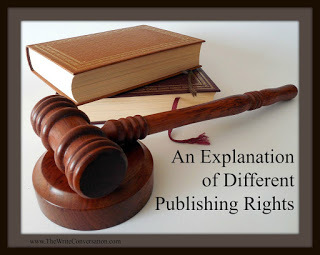 Often I'm asked questions about rights. What exactly does that mean? Is it okay to sell all rights? Why do I need to know about rights?I wrote it so doesn’t that mean I have the rights to my own material?
Often I'm asked questions about rights. What exactly does that mean? Is it okay to sell all rights? Why do I need to know about rights?I wrote it so doesn’t that mean I have the rights to my own material?
Rights is a rather complex area of writing. Every writer should be aware of the different types of rights and what they mean.When you submit an article to a publisher, part of what is noted in the top right hand portion of your manuscript is what rights you are offering. Before submitting make sure you understand exactly what rules exist with the rights you are offering.
The Most Common Rights First Rights is the most common and most desirable.First Rights—This is the most common and most desirable type of rights. First rights means the publisher has the right to publish your work for the first time, one time.
First Rights is the most common and most desirable.First Rights—This is the most common and most desirable type of rights. First rights means the publisher has the right to publish your work for the first time, one time.
All Rights—An all rights sale is just that. You have sold all rights to the material and it now belongs to the publisher who can do whatever he chooses and publish it as many times as he wants without any further payment to you. However, you need to understand that you have not sold the ability to use your story again; you have just sold the story in that version, that exact arrangement of words. In other words, you can rewrite the same story with other words and offer it again as first rights to a different publication. In most cases, it is best not to sell all rights. Occasionally you may decide to offer all rights. If you have submitted to a high-profile magazine and want to be able to include it in your clip file, you may want to accept an all rights contract. Or if you have an opportunity to share your story in a unique way and you probably wouldn’t use it in that format again, you may consider all rights.
 Reprint Rights are sometimes called second rights.Reprint Rights—Once an article has been published, you may offer it to another publication with reprint rights. Sometimes reprint rights are called second rights. Another good reason not to sell all rights is so you are able to offer reprint rights to other publications. Be sure to check your contract, however, because most publications have a certain amount of time you must wait after your article is in print before the rights revert to you. Noncompeting markets are a good place to look for reprint opportunities. For example, if your article was published in a denominational magazine, look for opportunities in magazines of other denominations. If you published an article in a regional parenting magazine, look at parenting publications in other parts of the country. There are many publications eager for articles and reprints can be a good way to increase your income with a minimum amount of additional work.
Reprint Rights are sometimes called second rights.Reprint Rights—Once an article has been published, you may offer it to another publication with reprint rights. Sometimes reprint rights are called second rights. Another good reason not to sell all rights is so you are able to offer reprint rights to other publications. Be sure to check your contract, however, because most publications have a certain amount of time you must wait after your article is in print before the rights revert to you. Noncompeting markets are a good place to look for reprint opportunities. For example, if your article was published in a denominational magazine, look for opportunities in magazines of other denominations. If you published an article in a regional parenting magazine, look at parenting publications in other parts of the country. There are many publications eager for articles and reprints can be a good way to increase your income with a minimum amount of additional work.
First North American serial rights—When I first started writing, I thought this type or rights sounded extremely complicated. But it actually means what it says. You are offering rights for your article to be published in North America for the first time in a magazine or periodical (serial).
Rights need not be confusing. But it is something that writers need to understand in order to make the best choices for their work. Hope this helps a bit!
TWEETABLES
An explanation of different #publishing rights - @LindaGilden on @EdieMelson (Click to Tweet)
Don't let the different rights in #publishing confuse you - @LindaGilden (Click to Tweet)
 Linda Gilden is a wife, mother, and grandmother. She finds great joy (and excellent writing material) in time spent with her family. Helping writers understand PSL is one of the things she also loves to do through her newest book,
Called to Write
. This month she is excited about having a chance to set new goals for the new year and maybe even do a few more rewrites!
Linda Gilden is a wife, mother, and grandmother. She finds great joy (and excellent writing material) in time spent with her family. Helping writers understand PSL is one of the things she also loves to do through her newest book,
Called to Write
. This month she is excited about having a chance to set new goals for the new year and maybe even do a few more rewrites!
To find out more about Linda, her writing, and her ministry, visit www.lindagilden.com . You can also connect with her on Twitter @LindaGilden and Facebook at Author Linda Gilden.
 Often I'm asked questions about rights. What exactly does that mean? Is it okay to sell all rights? Why do I need to know about rights?I wrote it so doesn’t that mean I have the rights to my own material?
Often I'm asked questions about rights. What exactly does that mean? Is it okay to sell all rights? Why do I need to know about rights?I wrote it so doesn’t that mean I have the rights to my own material?Rights is a rather complex area of writing. Every writer should be aware of the different types of rights and what they mean.When you submit an article to a publisher, part of what is noted in the top right hand portion of your manuscript is what rights you are offering. Before submitting make sure you understand exactly what rules exist with the rights you are offering.
The Most Common Rights
 First Rights is the most common and most desirable.First Rights—This is the most common and most desirable type of rights. First rights means the publisher has the right to publish your work for the first time, one time.
First Rights is the most common and most desirable.First Rights—This is the most common and most desirable type of rights. First rights means the publisher has the right to publish your work for the first time, one time. All Rights—An all rights sale is just that. You have sold all rights to the material and it now belongs to the publisher who can do whatever he chooses and publish it as many times as he wants without any further payment to you. However, you need to understand that you have not sold the ability to use your story again; you have just sold the story in that version, that exact arrangement of words. In other words, you can rewrite the same story with other words and offer it again as first rights to a different publication. In most cases, it is best not to sell all rights. Occasionally you may decide to offer all rights. If you have submitted to a high-profile magazine and want to be able to include it in your clip file, you may want to accept an all rights contract. Or if you have an opportunity to share your story in a unique way and you probably wouldn’t use it in that format again, you may consider all rights.
 Reprint Rights are sometimes called second rights.Reprint Rights—Once an article has been published, you may offer it to another publication with reprint rights. Sometimes reprint rights are called second rights. Another good reason not to sell all rights is so you are able to offer reprint rights to other publications. Be sure to check your contract, however, because most publications have a certain amount of time you must wait after your article is in print before the rights revert to you. Noncompeting markets are a good place to look for reprint opportunities. For example, if your article was published in a denominational magazine, look for opportunities in magazines of other denominations. If you published an article in a regional parenting magazine, look at parenting publications in other parts of the country. There are many publications eager for articles and reprints can be a good way to increase your income with a minimum amount of additional work.
Reprint Rights are sometimes called second rights.Reprint Rights—Once an article has been published, you may offer it to another publication with reprint rights. Sometimes reprint rights are called second rights. Another good reason not to sell all rights is so you are able to offer reprint rights to other publications. Be sure to check your contract, however, because most publications have a certain amount of time you must wait after your article is in print before the rights revert to you. Noncompeting markets are a good place to look for reprint opportunities. For example, if your article was published in a denominational magazine, look for opportunities in magazines of other denominations. If you published an article in a regional parenting magazine, look at parenting publications in other parts of the country. There are many publications eager for articles and reprints can be a good way to increase your income with a minimum amount of additional work.First North American serial rights—When I first started writing, I thought this type or rights sounded extremely complicated. But it actually means what it says. You are offering rights for your article to be published in North America for the first time in a magazine or periodical (serial).
Rights need not be confusing. But it is something that writers need to understand in order to make the best choices for their work. Hope this helps a bit!
TWEETABLES
An explanation of different #publishing rights - @LindaGilden on @EdieMelson (Click to Tweet)
Don't let the different rights in #publishing confuse you - @LindaGilden (Click to Tweet)
 Linda Gilden is a wife, mother, and grandmother. She finds great joy (and excellent writing material) in time spent with her family. Helping writers understand PSL is one of the things she also loves to do through her newest book,
Called to Write
. This month she is excited about having a chance to set new goals for the new year and maybe even do a few more rewrites!
Linda Gilden is a wife, mother, and grandmother. She finds great joy (and excellent writing material) in time spent with her family. Helping writers understand PSL is one of the things she also loves to do through her newest book,
Called to Write
. This month she is excited about having a chance to set new goals for the new year and maybe even do a few more rewrites!To find out more about Linda, her writing, and her ministry, visit www.lindagilden.com . You can also connect with her on Twitter @LindaGilden and Facebook at Author Linda Gilden.
Published on May 11, 2016 01:00
May 10, 2016
The Publishing Wheel
by Cindy Sproles @CindyDevoted
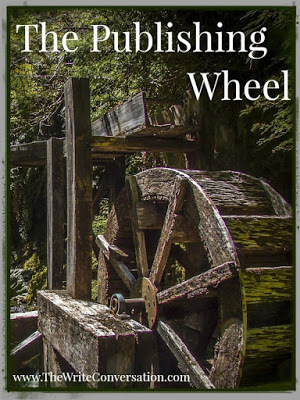 The writing industry is like a giant water wheel. It’s huge, filled with buckets, and it turns constantly. Now you ask, “What is she talking about?” It was a somewhat lame attempt at vivid description, and if you’re willing to bear with me – you’ll see.
The writing industry is like a giant water wheel. It’s huge, filled with buckets, and it turns constantly. Now you ask, “What is she talking about?” It was a somewhat lame attempt at vivid description, and if you’re willing to bear with me – you’ll see.
When I was a child, my cousin and I loved going to my grandmother’s house. She lived deep in the country, and about a mile from her house was a grist mill. Fully functioning.
We’d traipse through the creek, jump on rocks and make our way to the mill. On the side of a barn-type building, stood a huge wheel that turned at the speed of molasses. Water from the creek was forced through a trough, filling each bucket that surrounded the wheel. As the buckets filled with water, the wheel turned. When the water buckets made it to the top of the wheel, they caught on a wooden bar that tipped and emptied them back into the creek. This turning wheel was attached to a gear inside the mill with two huge, round stones. The farmer would dump scoops of dried corn kernels onto the wheel, lower the top stone, powered by the water wheel, and as the stones turned they crushed the corn into . . . you guessed it – flour.
I tell you this because, this is how the writing industry works. Once you get your head around the concept, then rejection letters aren’t quite so bitter.Let’s bring it into context. The industry is a huge wheel, loaded with buckets. As the wheel turns, tons of manuscripts drop into the buckets. The heavier the buckets are, the slower the wheel turns. It takes time – sometimes a long time, for that wheel to make a complete turn.
 Now that you have that picture in your head, think of each bucket as a specific genre or trend. Today the top bucket is heavy with Amish fiction. Your genre bucket (rocket science thrillers), may just be filling. Remember, the wheel turns slow. The bucket in front of yours will reach the top of the wheel long before your bucket. It may even stop and teeter on the top while publishers are working their way through them. But eventually the wheel begins to turn again and your bucket will reach the top and dump.
Now that you have that picture in your head, think of each bucket as a specific genre or trend. Today the top bucket is heavy with Amish fiction. Your genre bucket (rocket science thrillers), may just be filling. Remember, the wheel turns slow. The bucket in front of yours will reach the top of the wheel long before your bucket. It may even stop and teeter on the top while publishers are working their way through them. But eventually the wheel begins to turn again and your bucket will reach the top and dump.
Why this elaborate attempt at drawing a mental picture? Because, it says volumes (no pun intended), about the trends of publishing. What is popular today, will soon begin the downward turn, and what was less popular yesterday (rocket science thrillers), slowly works its way to the top of the wheel to become the hotest new trend.
When you hear authors tell you about timing, listen. They want you to learn patience in an industry that moves. . .like I said – molasses. Eventually, your genre will be on top and folks will be clamoring for the newest novel from your bucket.
What do you do while you wait for the wheel to turn? You learn the craft of writing. You spend quality time spinning and weaving words, studying techniques, and practicing what will make your story/stories better. You master the craft and then you study and practice some more.
You may even find yourself digging through the bucket, trying to retrieve what you’ve written so you can make that better as well.
Rejection letters do not necessarily mean your writing is not good. Sometimes it means that it’s just not time. Your bucket hasn’t reached the top yet. Publishers have slots and holes they must fill to meet the trends of the industry. As those needs fill, and the trend changes, they dig into a new bucket looking for the nuggets of gold that will set the newest trends. Publishers ride trends like a surfer rides the waves. Sometimes they invest into a wave that looks like it will provide a long ride, when in essence, it’s only a swell.
 Trends in reading change quickly. It’s important to keep up with those trends. You may, from time-to-time, find a new niche’ for yourself as you follow what rises to the top.
Trends in reading change quickly. It’s important to keep up with those trends. You may, from time-to-time, find a new niche’ for yourself as you follow what rises to the top.
All this to say, you can’t rush the industry. And if your rushing is the difference in self-publishing a work before it’s time, then you may find yourself catching a swell and missing the wave.
There’s something to be said for patience in writing. Waiting. It’s good to learn how to handle rejection and how to refocus the disappointment into determination. My brother recently shared a nod of praise for me. “I’m proud of you. You kept getting knocked back, but it only forced you to do better. Time has made you better. Better as a person, better as a teacher, and awesome as an author.”
Sometimes waiting on the wheel is well worth the time, be in months or years. The great Robert Benson said, "Determined is the proper posture for a writer. Hurried is NOT the proper posture for a writer."
Ride the wheel. Eventually your bucket will reach the top.
TWEETABLES
The #Publishing Wheel turns slowly, but it does turn - @CindyDevoted (Click to Tweet)
Patience and #publishing go hand-in-hand - @CindyDevoted on @EdieMelson (Click to Tweet)
 Cindy Sproles is an award-winning author and popular speaker. She is the cofounder of Christian Devotions ministries and managing editor of Straight Street Books and SonRise Devotionals, imprints of Lighthouse Publishing of the Carolinas. Cindy is the executive editor of www.christiandevotions.us and www.inspireafire.com. She teaches at writers conferences nationwide and directs The Asheville Christian Writers Conference - Writers Boot Camp.
Cindy Sproles is an award-winning author and popular speaker. She is the cofounder of Christian Devotions ministries and managing editor of Straight Street Books and SonRise Devotionals, imprints of Lighthouse Publishing of the Carolinas. Cindy is the executive editor of www.christiandevotions.us and www.inspireafire.com. She teaches at writers conferences nationwide and directs The Asheville Christian Writers Conference - Writers Boot Camp.
She is the author of two devotionals, He Said, She Said - Learning to Live a Life of Passion and New Sheets - Thirty Days to Refine You into the Woman You Can Be. Cindy's debut novel, Mercy's Rain, is available at major retailers. Visit Cindy at www.cindysproles.com and book her for your next conference or ladies retreat. Also connect with her on Facebook and Twitter.
 The writing industry is like a giant water wheel. It’s huge, filled with buckets, and it turns constantly. Now you ask, “What is she talking about?” It was a somewhat lame attempt at vivid description, and if you’re willing to bear with me – you’ll see.
The writing industry is like a giant water wheel. It’s huge, filled with buckets, and it turns constantly. Now you ask, “What is she talking about?” It was a somewhat lame attempt at vivid description, and if you’re willing to bear with me – you’ll see.When I was a child, my cousin and I loved going to my grandmother’s house. She lived deep in the country, and about a mile from her house was a grist mill. Fully functioning.
We’d traipse through the creek, jump on rocks and make our way to the mill. On the side of a barn-type building, stood a huge wheel that turned at the speed of molasses. Water from the creek was forced through a trough, filling each bucket that surrounded the wheel. As the buckets filled with water, the wheel turned. When the water buckets made it to the top of the wheel, they caught on a wooden bar that tipped and emptied them back into the creek. This turning wheel was attached to a gear inside the mill with two huge, round stones. The farmer would dump scoops of dried corn kernels onto the wheel, lower the top stone, powered by the water wheel, and as the stones turned they crushed the corn into . . . you guessed it – flour.
I tell you this because, this is how the writing industry works. Once you get your head around the concept, then rejection letters aren’t quite so bitter.Let’s bring it into context. The industry is a huge wheel, loaded with buckets. As the wheel turns, tons of manuscripts drop into the buckets. The heavier the buckets are, the slower the wheel turns. It takes time – sometimes a long time, for that wheel to make a complete turn.
 Now that you have that picture in your head, think of each bucket as a specific genre or trend. Today the top bucket is heavy with Amish fiction. Your genre bucket (rocket science thrillers), may just be filling. Remember, the wheel turns slow. The bucket in front of yours will reach the top of the wheel long before your bucket. It may even stop and teeter on the top while publishers are working their way through them. But eventually the wheel begins to turn again and your bucket will reach the top and dump.
Now that you have that picture in your head, think of each bucket as a specific genre or trend. Today the top bucket is heavy with Amish fiction. Your genre bucket (rocket science thrillers), may just be filling. Remember, the wheel turns slow. The bucket in front of yours will reach the top of the wheel long before your bucket. It may even stop and teeter on the top while publishers are working their way through them. But eventually the wheel begins to turn again and your bucket will reach the top and dump.Why this elaborate attempt at drawing a mental picture? Because, it says volumes (no pun intended), about the trends of publishing. What is popular today, will soon begin the downward turn, and what was less popular yesterday (rocket science thrillers), slowly works its way to the top of the wheel to become the hotest new trend.
When you hear authors tell you about timing, listen. They want you to learn patience in an industry that moves. . .like I said – molasses. Eventually, your genre will be on top and folks will be clamoring for the newest novel from your bucket.
What do you do while you wait for the wheel to turn? You learn the craft of writing. You spend quality time spinning and weaving words, studying techniques, and practicing what will make your story/stories better. You master the craft and then you study and practice some more.
You may even find yourself digging through the bucket, trying to retrieve what you’ve written so you can make that better as well.
Rejection letters do not necessarily mean your writing is not good. Sometimes it means that it’s just not time. Your bucket hasn’t reached the top yet. Publishers have slots and holes they must fill to meet the trends of the industry. As those needs fill, and the trend changes, they dig into a new bucket looking for the nuggets of gold that will set the newest trends. Publishers ride trends like a surfer rides the waves. Sometimes they invest into a wave that looks like it will provide a long ride, when in essence, it’s only a swell.
 Trends in reading change quickly. It’s important to keep up with those trends. You may, from time-to-time, find a new niche’ for yourself as you follow what rises to the top.
Trends in reading change quickly. It’s important to keep up with those trends. You may, from time-to-time, find a new niche’ for yourself as you follow what rises to the top. All this to say, you can’t rush the industry. And if your rushing is the difference in self-publishing a work before it’s time, then you may find yourself catching a swell and missing the wave.
There’s something to be said for patience in writing. Waiting. It’s good to learn how to handle rejection and how to refocus the disappointment into determination. My brother recently shared a nod of praise for me. “I’m proud of you. You kept getting knocked back, but it only forced you to do better. Time has made you better. Better as a person, better as a teacher, and awesome as an author.”
Sometimes waiting on the wheel is well worth the time, be in months or years. The great Robert Benson said, "Determined is the proper posture for a writer. Hurried is NOT the proper posture for a writer."
Ride the wheel. Eventually your bucket will reach the top.
TWEETABLES
The #Publishing Wheel turns slowly, but it does turn - @CindyDevoted (Click to Tweet)
Patience and #publishing go hand-in-hand - @CindyDevoted on @EdieMelson (Click to Tweet)
 Cindy Sproles is an award-winning author and popular speaker. She is the cofounder of Christian Devotions ministries and managing editor of Straight Street Books and SonRise Devotionals, imprints of Lighthouse Publishing of the Carolinas. Cindy is the executive editor of www.christiandevotions.us and www.inspireafire.com. She teaches at writers conferences nationwide and directs The Asheville Christian Writers Conference - Writers Boot Camp.
Cindy Sproles is an award-winning author and popular speaker. She is the cofounder of Christian Devotions ministries and managing editor of Straight Street Books and SonRise Devotionals, imprints of Lighthouse Publishing of the Carolinas. Cindy is the executive editor of www.christiandevotions.us and www.inspireafire.com. She teaches at writers conferences nationwide and directs The Asheville Christian Writers Conference - Writers Boot Camp. She is the author of two devotionals, He Said, She Said - Learning to Live a Life of Passion and New Sheets - Thirty Days to Refine You into the Woman You Can Be. Cindy's debut novel, Mercy's Rain, is available at major retailers. Visit Cindy at www.cindysproles.com and book her for your next conference or ladies retreat. Also connect with her on Facebook and Twitter.
Published on May 10, 2016 01:00
May 9, 2016
How to Add Personalized Social Media Buttons to a WordPress Site
by Edie Melson @EdieMelson
NOTE: This is reposted from www.TheAuthorRoadmap.com. Be sure to stop by and sign up for updates.
Today I'm excited to show you how to add personalized social media buttons to a free or paid WordPress site. You may notice this blog is sporting a new set of buttons right below my header. They were surprisingly easy to install and I couldn't wait to share how to do it.
The screencast below contains step-by-step instructions for adding them to a WordPress site. You can also add them to a Blogger site, but the process is slightly different. I shared how to do that in a SEPARATE screencast this past Monday, on my other site, www.TheWriteConversation.com. So if you have a Blogger site, visit How to Add a Personalized Social Media Buttons to a Blogger Site.
Be sure to leave any questions or comments in the comments section below.
TWEETABLES
How to Add Personalized #SocialMedia Buttons to a WordPress Site - @EdieMelson (Click to Tweet)
Add personalized #socialmedia buttons to your #blog with step-by-step instructions from @EdieMelson (Click to Tweet)
NOTE: This is reposted from www.TheAuthorRoadmap.com. Be sure to stop by and sign up for updates.
Today I'm excited to show you how to add personalized social media buttons to a free or paid WordPress site. You may notice this blog is sporting a new set of buttons right below my header. They were surprisingly easy to install and I couldn't wait to share how to do it.
The screencast below contains step-by-step instructions for adding them to a WordPress site. You can also add them to a Blogger site, but the process is slightly different. I shared how to do that in a SEPARATE screencast this past Monday, on my other site, www.TheWriteConversation.com. So if you have a Blogger site, visit How to Add a Personalized Social Media Buttons to a Blogger Site.
Be sure to leave any questions or comments in the comments section below.
TWEETABLES
How to Add Personalized #SocialMedia Buttons to a WordPress Site - @EdieMelson (Click to Tweet)
Add personalized #socialmedia buttons to your #blog with step-by-step instructions from @EdieMelson (Click to Tweet)
Published on May 09, 2016 01:00
May 8, 2016
A Mother's Love
by Sarah Van Diest @SarahVanDiest
 1 Corinthians 13:4-7 Love is patient; love is kind. Love is not jealous; is not proud; is not conceited; does not act foolishly; is not selfish; is not easily provoked to anger; keeps no record of wrongs; takes no pleasure in unrighteousness, but rejoices in the truth; love bears all things, believes all things, hopes all things, and endures all things.
1 Corinthians 13:4-7 Love is patient; love is kind. Love is not jealous; is not proud; is not conceited; does not act foolishly; is not selfish; is not easily provoked to anger; keeps no record of wrongs; takes no pleasure in unrighteousness, but rejoices in the truth; love bears all things, believes all things, hopes all things, and endures all things.
I have strange and disjointed thoughts when it comes to Mother’s Day. Maybe it all stems from whacking into one particular Mother’s Day with full force, as I wrote about last year on Mother's Day Mayhem , but maybe that’s not the cause.
I struggle sometimes to enjoy the day. It’s full of sweet joy juxtaposed with mindful discomfort. I’m not sure why. Does anyone relate? I know there are friends of mine out there who dread the day. It’s full of painful reminders. Every rose handed out signifies for them a tragic memory, an unfulfilled desire, or some unspoken and unrelieved sorrow. I grieve for them. All I know to do is to love them.I suppose that’s what love is: sweet joy and mindful discomfort, or even agony. Love runs the gamut. It encompasses our most prized memories and cradles them in the same hands that hold our deepest losses. A mother’s love does that.
A mother’s love delights to see her child find interest and excitement in the pictures nature paints on a rock.
 A mother’s love remembers the way her toddler says words just slightly off, and captures the sweetness of their newly created word in a forever memory.
A mother’s love remembers the way her toddler says words just slightly off, and captures the sweetness of their newly created word in a forever memory.
A mother’s love stays by the side of her ailing child in the hospital bed and waits and prays and cries and breathes deep breaths of desperate hopefulness.
A mother’s love walks from her car to the police station and looks into the eyes of her beloved teen and declares by her presence that she will never give up.
A mother’s love laughs at jokes that make no sense and silly faces she’s seen a dozen times, and reflects life back into her child’s heart.
A mother’s love drives miles and miles catching up to her child’s bus to present the forgotten sleeping bag because the night was going to be cold and the ground hard.
 A mother’s love prays, relentlessly prays, for the prodigal to come home, and she stores up all the treasures needed for the party for that anticipated day.
A mother’s love prays, relentlessly prays, for the prodigal to come home, and she stores up all the treasures needed for the party for that anticipated day.
A mother’s love sheds tears of joy when her child, after tireless effort and numerous attempts, finally passes the test and makes the grade.
A mother’s love is defined by hope. Her heart believes all things and hopes all things. She cannot help it.
A mother’s love is etched on her heart. It cannot be undone. Though some have hardened their hearts and others have cast off their sentiments, the etchings remain. Their child’s life is scored deeply into their souls; happily irreparable.
Our Father made us this way.
Our Father loves us this way.
All of us, mothers or not, male or female, are called to love this way. A mother who loves is just a tangible example of what the Father’s love looks like.
Finish my blog and write your own line: A mother’s love….
TWEETABLE
"A mother who loves is just a tangible example of the Father's love." @SarahVanDiest (Click to Tweet)
 Sarah has worked in Christian publishing since 2005 as both an editor and an agent.
Sarah has worked in Christian publishing since 2005 as both an editor and an agent.
Currently, she works with her husband, David, in their agency, the Van Diest Literary Agency. Writing is a growing passion for her as she hopes to bring hope to hurting hearts.
 1 Corinthians 13:4-7 Love is patient; love is kind. Love is not jealous; is not proud; is not conceited; does not act foolishly; is not selfish; is not easily provoked to anger; keeps no record of wrongs; takes no pleasure in unrighteousness, but rejoices in the truth; love bears all things, believes all things, hopes all things, and endures all things.
1 Corinthians 13:4-7 Love is patient; love is kind. Love is not jealous; is not proud; is not conceited; does not act foolishly; is not selfish; is not easily provoked to anger; keeps no record of wrongs; takes no pleasure in unrighteousness, but rejoices in the truth; love bears all things, believes all things, hopes all things, and endures all things.I have strange and disjointed thoughts when it comes to Mother’s Day. Maybe it all stems from whacking into one particular Mother’s Day with full force, as I wrote about last year on Mother's Day Mayhem , but maybe that’s not the cause.
I struggle sometimes to enjoy the day. It’s full of sweet joy juxtaposed with mindful discomfort. I’m not sure why. Does anyone relate? I know there are friends of mine out there who dread the day. It’s full of painful reminders. Every rose handed out signifies for them a tragic memory, an unfulfilled desire, or some unspoken and unrelieved sorrow. I grieve for them. All I know to do is to love them.I suppose that’s what love is: sweet joy and mindful discomfort, or even agony. Love runs the gamut. It encompasses our most prized memories and cradles them in the same hands that hold our deepest losses. A mother’s love does that.
A mother’s love delights to see her child find interest and excitement in the pictures nature paints on a rock.
 A mother’s love remembers the way her toddler says words just slightly off, and captures the sweetness of their newly created word in a forever memory.
A mother’s love remembers the way her toddler says words just slightly off, and captures the sweetness of their newly created word in a forever memory.A mother’s love stays by the side of her ailing child in the hospital bed and waits and prays and cries and breathes deep breaths of desperate hopefulness.
A mother’s love walks from her car to the police station and looks into the eyes of her beloved teen and declares by her presence that she will never give up.
A mother’s love laughs at jokes that make no sense and silly faces she’s seen a dozen times, and reflects life back into her child’s heart.
A mother’s love drives miles and miles catching up to her child’s bus to present the forgotten sleeping bag because the night was going to be cold and the ground hard.
 A mother’s love prays, relentlessly prays, for the prodigal to come home, and she stores up all the treasures needed for the party for that anticipated day.
A mother’s love prays, relentlessly prays, for the prodigal to come home, and she stores up all the treasures needed for the party for that anticipated day.A mother’s love sheds tears of joy when her child, after tireless effort and numerous attempts, finally passes the test and makes the grade.
A mother’s love is defined by hope. Her heart believes all things and hopes all things. She cannot help it.
A mother’s love is etched on her heart. It cannot be undone. Though some have hardened their hearts and others have cast off their sentiments, the etchings remain. Their child’s life is scored deeply into their souls; happily irreparable.
Our Father made us this way.
Our Father loves us this way.
All of us, mothers or not, male or female, are called to love this way. A mother who loves is just a tangible example of what the Father’s love looks like.
Finish my blog and write your own line: A mother’s love….
TWEETABLE
"A mother who loves is just a tangible example of the Father's love." @SarahVanDiest (Click to Tweet)
 Sarah has worked in Christian publishing since 2005 as both an editor and an agent.
Sarah has worked in Christian publishing since 2005 as both an editor and an agent.Currently, she works with her husband, David, in their agency, the Van Diest Literary Agency. Writing is a growing passion for her as she hopes to bring hope to hurting hearts.
Published on May 08, 2016 01:00
May 7, 2016
Your First Writing Assignment
Today I'm excited to welcome a man I greatly admire, Bob Hostetler. He's an author beyond compare, as well as incredible conference speaker. He's also a fellow blogger on Guideposts.org. But I asked him here today for two reasons. Number one, because I want you to have a chance to learn from him. And number two, because he has a fabulous book out and I wanted you to hear about it. So be sure to give him a warm, Write Conversation welcome!
Your First Writing Assignmentby Bob Hostetler @BobHoss
 If your writing doesn’t start with this practice, you’re cheating yourself
If your writing doesn’t start with this practice, you’re cheating yourself
Lauren Winner, author of the wonderful memoirs, Girl Meets God and Mudhouse Sabbath, tells about an experience she had when a writing student of hers showed her part of a memoir that was astounding, far better than this student’s usual writing. Winner asked the student what had transformed her writing over the course of just a few months.The student said she’d gotten stuck on a major piece she was writing and told her priest about it.
The priest said, “Have you prayed about this?”
She hadn’t.
So she did.
And the quality of her writing soared.
Winner says, before that experience, and before saw with her own eyes the transformation in that student’s writing, “It never occurred to me . . . that there might be a connection” between prayer and writing. But there totally is.
Fifteen or so years ago, I thought I was totally spent as a writer. I’d been through a three-year process of revision and revulsion on one book that had left me doubting my ability, and drained of all enthusiasm for writing.
So I prayed.
I do that when I get desperate . . . and there’s nothing good on T.V.
 And God sent me manna from heaven—in the form of an assignment to work on a project called The Prayer Bible. For the next couple months, I spent my workdays praying through the second half of the Old Testament and recording many of those prayers as prayer prompts for that Bible’s marginalia. It was a process that not only revived me, and stoked my prayer life; I believe it saved my writing ministry.
And God sent me manna from heaven—in the form of an assignment to work on a project called The Prayer Bible. For the next couple months, I spent my workdays praying through the second half of the Old Testament and recording many of those prayers as prayer prompts for that Bible’s marginalia. It was a process that not only revived me, and stoked my prayer life; I believe it saved my writing ministry.
It did something else: It changed the writing process for me. It made prayer an indispensible part of the writing process for me, so much so, in fact, that I don’t know how I ever wrote a thing before I came, like Lauren Winner, to see the absolute connectedness that exists between prayer and writing.
It shouldn’t have been a surprise, of course. God was talking about writing as much as anything when he spoke to Zerubbabel through Zechariah: “Not by might nor by power, but by my Spirit,' says the Lord Almighty” (Zechariah 4:6, NIV).
If I truly believed that, why would I try to write anything in my own strength, apart from prayerful dependence on God? In recent years, I have come to depend on God through prayer in my daily life, and so I have come to depend on God through prayer in my writing life.
 I pray before I write. I pray while I write. And then I pray after I write that God will even further transform my offering through the work of godly publishers, editors, designers, artists, and so on.
I pray before I write. I pray while I write. And then I pray after I write that God will even further transform my offering through the work of godly publishers, editors, designers, artists, and so on.
I pray, not to change God, or to change others, but to change me. I pray for wisdom to manage my time wisely, for discipline to apply my mind to my writing and my butt to the chair. I pray for my memory (at least until I forget). For some writing projects, I’ve assembled a prayer team to support my writing with their prayers, and I’ve tried to keep them up-to-date via email.
If you are wise (at least as wise as me, which is not a high bar at all), you will make prayer your first writing assignment every day. Before you sharpen your pencil or turn on your computer, before you outline, before you jump into a writing exercise or research task, pray. Pray before you write, as you write, after you write. Pray for self-awareness, for focus, for inspiration, for protection. Pray to hear God clearly and to respond to him fully. Pray (as I often do) to write better than you are capable of writing.
You might want to put a Post-It note on your computer screen that reads, “Have you prayed about this?” You might want to journal your prayers. You might learn to pray God’s Word, the process that rescued my writing.
If you need help in this area, you might add Richard Foster’s Prayer: The Heart’s True Home to your reading (or Philip Yancey’s Prayer or Robert Benson’s Living Prayer, or one of the volumes of Phyllis Tickle’s The Divine Hours, which can help you pray the daily office). You might make an annual prayer retreat to a monastery or retreat center. You might do all of those things or none of them.
But if prayer is not a central part of your process, an indispensable part of your writing, your first writing assignment every day, then please believe men when I say you’re cheating your readers, you’re cheating your editors, you’re cheating God. Most of all, of course, you’re cheating yourself.
TWEETABLESIf #prayer isn't part of your #writing process, you're cheating your readers - @BobHoss (Click to Tweet)
Your FIRST #Writing Assignment - @BobHoss on @EdieMelson (Click to Tweet)
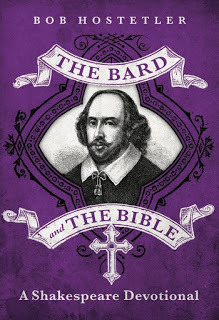 The Bard and The Bibleby Bob Hostetler
The Bard and The Bibleby Bob Hostetler
The Bard and the Bible pairs 365 short passages from the King James Version of the Bible with lines from Shakespeare’s plays and sonnets. The poetry of the Bard of Stratford-on-Avon and the power of God’s Word will enrich the reader’s understanding and appreciation of both, and provide new ways to encounter and respond to God through His Word.
A year of daily readings in both Shakespeare and the King James Version yields intellectual stimulation and spiritual inspiration for readers, enlarging their minds as it changes their lives.
 Bob Hostetler is an award-winning writer, editor, and speaker from southwestern Ohio. His books include the award-winning Don’t Check Your Brains at the Door (co-authored with Josh McDowell) and The Red-Letter Prayer Life. He is also the author of the iPhone/iPad app, 31 Ways to Pray for Your Children. His next book, The Bard and the Bible (A Shakespeare Devotional), will be released in August (it can be pre-ordered now).
Bob Hostetler is an award-winning writer, editor, and speaker from southwestern Ohio. His books include the award-winning Don’t Check Your Brains at the Door (co-authored with Josh McDowell) and The Red-Letter Prayer Life. He is also the author of the iPhone/iPad app, 31 Ways to Pray for Your Children. His next book, The Bard and the Bible (A Shakespeare Devotional), will be released in August (it can be pre-ordered now).
Your First Writing Assignmentby Bob Hostetler @BobHoss
 If your writing doesn’t start with this practice, you’re cheating yourself
If your writing doesn’t start with this practice, you’re cheating yourselfLauren Winner, author of the wonderful memoirs, Girl Meets God and Mudhouse Sabbath, tells about an experience she had when a writing student of hers showed her part of a memoir that was astounding, far better than this student’s usual writing. Winner asked the student what had transformed her writing over the course of just a few months.The student said she’d gotten stuck on a major piece she was writing and told her priest about it.
The priest said, “Have you prayed about this?”
She hadn’t.
So she did.
And the quality of her writing soared.
Winner says, before that experience, and before saw with her own eyes the transformation in that student’s writing, “It never occurred to me . . . that there might be a connection” between prayer and writing. But there totally is.
Fifteen or so years ago, I thought I was totally spent as a writer. I’d been through a three-year process of revision and revulsion on one book that had left me doubting my ability, and drained of all enthusiasm for writing.
So I prayed.
I do that when I get desperate . . . and there’s nothing good on T.V.
 And God sent me manna from heaven—in the form of an assignment to work on a project called The Prayer Bible. For the next couple months, I spent my workdays praying through the second half of the Old Testament and recording many of those prayers as prayer prompts for that Bible’s marginalia. It was a process that not only revived me, and stoked my prayer life; I believe it saved my writing ministry.
And God sent me manna from heaven—in the form of an assignment to work on a project called The Prayer Bible. For the next couple months, I spent my workdays praying through the second half of the Old Testament and recording many of those prayers as prayer prompts for that Bible’s marginalia. It was a process that not only revived me, and stoked my prayer life; I believe it saved my writing ministry.It did something else: It changed the writing process for me. It made prayer an indispensible part of the writing process for me, so much so, in fact, that I don’t know how I ever wrote a thing before I came, like Lauren Winner, to see the absolute connectedness that exists between prayer and writing.
It shouldn’t have been a surprise, of course. God was talking about writing as much as anything when he spoke to Zerubbabel through Zechariah: “Not by might nor by power, but by my Spirit,' says the Lord Almighty” (Zechariah 4:6, NIV).
If I truly believed that, why would I try to write anything in my own strength, apart from prayerful dependence on God? In recent years, I have come to depend on God through prayer in my daily life, and so I have come to depend on God through prayer in my writing life.
 I pray before I write. I pray while I write. And then I pray after I write that God will even further transform my offering through the work of godly publishers, editors, designers, artists, and so on.
I pray before I write. I pray while I write. And then I pray after I write that God will even further transform my offering through the work of godly publishers, editors, designers, artists, and so on. I pray, not to change God, or to change others, but to change me. I pray for wisdom to manage my time wisely, for discipline to apply my mind to my writing and my butt to the chair. I pray for my memory (at least until I forget). For some writing projects, I’ve assembled a prayer team to support my writing with their prayers, and I’ve tried to keep them up-to-date via email.
If you are wise (at least as wise as me, which is not a high bar at all), you will make prayer your first writing assignment every day. Before you sharpen your pencil or turn on your computer, before you outline, before you jump into a writing exercise or research task, pray. Pray before you write, as you write, after you write. Pray for self-awareness, for focus, for inspiration, for protection. Pray to hear God clearly and to respond to him fully. Pray (as I often do) to write better than you are capable of writing.
You might want to put a Post-It note on your computer screen that reads, “Have you prayed about this?” You might want to journal your prayers. You might learn to pray God’s Word, the process that rescued my writing.
If you need help in this area, you might add Richard Foster’s Prayer: The Heart’s True Home to your reading (or Philip Yancey’s Prayer or Robert Benson’s Living Prayer, or one of the volumes of Phyllis Tickle’s The Divine Hours, which can help you pray the daily office). You might make an annual prayer retreat to a monastery or retreat center. You might do all of those things or none of them.
But if prayer is not a central part of your process, an indispensable part of your writing, your first writing assignment every day, then please believe men when I say you’re cheating your readers, you’re cheating your editors, you’re cheating God. Most of all, of course, you’re cheating yourself.
TWEETABLESIf #prayer isn't part of your #writing process, you're cheating your readers - @BobHoss (Click to Tweet)
Your FIRST #Writing Assignment - @BobHoss on @EdieMelson (Click to Tweet)
 The Bard and The Bibleby Bob Hostetler
The Bard and The Bibleby Bob HostetlerThe Bard and the Bible pairs 365 short passages from the King James Version of the Bible with lines from Shakespeare’s plays and sonnets. The poetry of the Bard of Stratford-on-Avon and the power of God’s Word will enrich the reader’s understanding and appreciation of both, and provide new ways to encounter and respond to God through His Word.
A year of daily readings in both Shakespeare and the King James Version yields intellectual stimulation and spiritual inspiration for readers, enlarging their minds as it changes their lives.
 Bob Hostetler is an award-winning writer, editor, and speaker from southwestern Ohio. His books include the award-winning Don’t Check Your Brains at the Door (co-authored with Josh McDowell) and The Red-Letter Prayer Life. He is also the author of the iPhone/iPad app, 31 Ways to Pray for Your Children. His next book, The Bard and the Bible (A Shakespeare Devotional), will be released in August (it can be pre-ordered now).
Bob Hostetler is an award-winning writer, editor, and speaker from southwestern Ohio. His books include the award-winning Don’t Check Your Brains at the Door (co-authored with Josh McDowell) and The Red-Letter Prayer Life. He is also the author of the iPhone/iPad app, 31 Ways to Pray for Your Children. His next book, The Bard and the Bible (A Shakespeare Devotional), will be released in August (it can be pre-ordered now).
Published on May 07, 2016 01:00
May 6, 2016
Writing with a Purpose
by Bruce Brady @BDBrady007
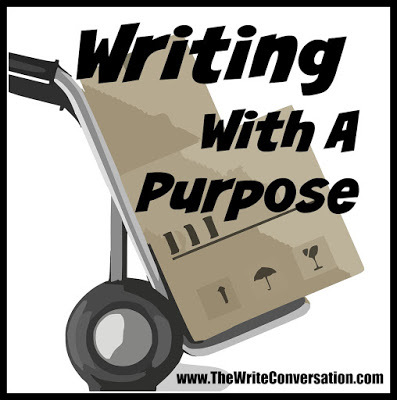 The Sovereign Lord has spoken to me, and I have listened. I have not rebelled or turned away. - Isaiah 50:5
The Sovereign Lord has spoken to me, and I have listened. I have not rebelled or turned away. - Isaiah 50:5
I’m moving!
I didn’t want to, but I’m moving. I’m leaving my church and friends behind, and relocating to a place I once considered undesirable. It’s a transient-filled town that thrives on tourism. It’s also noted for its abundant crime. I don’t really like crowds, and I’m certainly not a fan of lawlessness. I prefer peaceful quiet, so when I heard the words “let’s move here” come out of me, I questioned whether my motive was simply an impulse to care for my wife should she be widowed.
Many of you know I’m living with cancer and could be called home at any time. When I suggested we move, I thought the Lord was leading me to this place I don’t particularly like so that my wife would have family support when I leave this world. But I was wrong.
As soon as we committed to moving, God showed me—us—His reason for our painful packing. A new ministry. One He revealed through my wife. He often speaks to me through her about important matters. (I wish He’d stop doing that—it’s very humbling.)
 So what does our next chapter have to do with you, and writing? It comes down to obedience. As the verse says, when He spoke to us, we listened and didn’t rebel. Our submission to His lead has resulted in a home sale and move that has gone eerily smooth—with the exception of the painful packing experience. And this is the promise He makes to us all. When we follow Him, He smooths our paths (Exodus 23:20).
So what does our next chapter have to do with you, and writing? It comes down to obedience. As the verse says, when He spoke to us, we listened and didn’t rebel. Our submission to His lead has resulted in a home sale and move that has gone eerily smooth—with the exception of the painful packing experience. And this is the promise He makes to us all. When we follow Him, He smooths our paths (Exodus 23:20).
The ideas and words will flow as we obediently write for Him. Sure there will be bumps along the way. Sometimes they result from our taking control away from Him. Other times, He wants us to involve others in our writing process—because we were created for community.
The Lord created us to have an intimate relationship with Him. He also wants us to tell others about His desire to be deeply involved with every man, woman, and child. A relationship where we know He loves us and submit to His lead, knowing He will provide our best possible outcome. We can’t communicate the depths of His love without first developing a kinship with those we encounter. It’s the way He designed us.
While personal relationships are most effective for sharing His love, our writing can reach hundreds, thousands, even millions of people. Our words will influence those who read or hear them. Our stories have the power to change lives.
This is an exciting possibility and an awesome responsibility. When we write from a world view, we will most likely excite human lusts and fears. But when we write for Him, we can lift our readers to new heights. We can help them reach their full potential. We can lead them to the greatest relationship they’ll ever have. These are some of the best reasons to listen to and write for Him.
What do you think? Let me know in the comments below.
TWEETABLE
#Writing with a Purpose - @BDBrady007 on @EdieMelson (Click to Tweet)
 Bruce Brady is an author, writer and playwright. His work has appeared in Focus on the Family’s Thriving Family, www.ChristianDevotions.us, and on stage. Currently, Bruce is working on a Young Adult Novel about a boy who must deal with the death of his dad, being bullied, and helping his mom through her grief. His first five pages took third place in the ACFW South Carolina Chapter’s “First Five Pages” contest.
Bruce Brady is an author, writer and playwright. His work has appeared in Focus on the Family’s Thriving Family, www.ChristianDevotions.us, and on stage. Currently, Bruce is working on a Young Adult Novel about a boy who must deal with the death of his dad, being bullied, and helping his mom through her grief. His first five pages took third place in the ACFW South Carolina Chapter’s “First Five Pages” contest.
When he’s not writing, Bruce spends time learning from and helping other writers. He serves as Mentor of Word Weavers International’s Online Chapter, and as a member of Cross ‘N’ Pens, The Writer’s Plot, ACFW’s National and South Carolina Chapters.
“My dream is to entertain my readers and give them hope as they travel the rocky road of life.”
 The Sovereign Lord has spoken to me, and I have listened. I have not rebelled or turned away. - Isaiah 50:5
The Sovereign Lord has spoken to me, and I have listened. I have not rebelled or turned away. - Isaiah 50:5I’m moving!
I didn’t want to, but I’m moving. I’m leaving my church and friends behind, and relocating to a place I once considered undesirable. It’s a transient-filled town that thrives on tourism. It’s also noted for its abundant crime. I don’t really like crowds, and I’m certainly not a fan of lawlessness. I prefer peaceful quiet, so when I heard the words “let’s move here” come out of me, I questioned whether my motive was simply an impulse to care for my wife should she be widowed.
Many of you know I’m living with cancer and could be called home at any time. When I suggested we move, I thought the Lord was leading me to this place I don’t particularly like so that my wife would have family support when I leave this world. But I was wrong.
As soon as we committed to moving, God showed me—us—His reason for our painful packing. A new ministry. One He revealed through my wife. He often speaks to me through her about important matters. (I wish He’d stop doing that—it’s very humbling.)
 So what does our next chapter have to do with you, and writing? It comes down to obedience. As the verse says, when He spoke to us, we listened and didn’t rebel. Our submission to His lead has resulted in a home sale and move that has gone eerily smooth—with the exception of the painful packing experience. And this is the promise He makes to us all. When we follow Him, He smooths our paths (Exodus 23:20).
So what does our next chapter have to do with you, and writing? It comes down to obedience. As the verse says, when He spoke to us, we listened and didn’t rebel. Our submission to His lead has resulted in a home sale and move that has gone eerily smooth—with the exception of the painful packing experience. And this is the promise He makes to us all. When we follow Him, He smooths our paths (Exodus 23:20).The ideas and words will flow as we obediently write for Him. Sure there will be bumps along the way. Sometimes they result from our taking control away from Him. Other times, He wants us to involve others in our writing process—because we were created for community.
The Lord created us to have an intimate relationship with Him. He also wants us to tell others about His desire to be deeply involved with every man, woman, and child. A relationship where we know He loves us and submit to His lead, knowing He will provide our best possible outcome. We can’t communicate the depths of His love without first developing a kinship with those we encounter. It’s the way He designed us.
While personal relationships are most effective for sharing His love, our writing can reach hundreds, thousands, even millions of people. Our words will influence those who read or hear them. Our stories have the power to change lives.
This is an exciting possibility and an awesome responsibility. When we write from a world view, we will most likely excite human lusts and fears. But when we write for Him, we can lift our readers to new heights. We can help them reach their full potential. We can lead them to the greatest relationship they’ll ever have. These are some of the best reasons to listen to and write for Him.
What do you think? Let me know in the comments below.
TWEETABLE
#Writing with a Purpose - @BDBrady007 on @EdieMelson (Click to Tweet)
 Bruce Brady is an author, writer and playwright. His work has appeared in Focus on the Family’s Thriving Family, www.ChristianDevotions.us, and on stage. Currently, Bruce is working on a Young Adult Novel about a boy who must deal with the death of his dad, being bullied, and helping his mom through her grief. His first five pages took third place in the ACFW South Carolina Chapter’s “First Five Pages” contest.
Bruce Brady is an author, writer and playwright. His work has appeared in Focus on the Family’s Thriving Family, www.ChristianDevotions.us, and on stage. Currently, Bruce is working on a Young Adult Novel about a boy who must deal with the death of his dad, being bullied, and helping his mom through her grief. His first five pages took third place in the ACFW South Carolina Chapter’s “First Five Pages” contest.When he’s not writing, Bruce spends time learning from and helping other writers. He serves as Mentor of Word Weavers International’s Online Chapter, and as a member of Cross ‘N’ Pens, The Writer’s Plot, ACFW’s National and South Carolina Chapters.
“My dream is to entertain my readers and give them hope as they travel the rocky road of life.”
Published on May 06, 2016 01:00
May 5, 2016
Study the Craft of Writing Through Podcasts
by Lynn H Blackburn @LynnHBlackburn
 I’m a firm believer in studying the craft of writing. That’s why I read as many books on the craft as I can.
I’m a firm believer in studying the craft of writing. That’s why I read as many books on the craft as I can.
But I’m in a season of life where reading time is limited.
Maybe you can relate? You’d love to spend more time learning about everything from the business of writing to how other writers handle crippling fears, but you barely have enough time to write, much less read about writing.
Enter podcasts.If you aren’t familiar with podcasts, think of them like radio shows you can listen to whenever it’s convenient for you.
I find my best times to listen are when I’m in the car, while I’m getting ready in the morning, or while I’m cooking dinner in the evening.
 Podcast apps are available for smart phones.You can pull podcasts up directly from their websites and listen to them from your computer, but if you’ll be listening on the go you’ll want to check out the podcast apps available for smart phones. There are plenty of free options that allow you to subscribe to your favorites so you never miss an episode. (I have an iPhone and there is a podcast app built in).
Podcast apps are available for smart phones.You can pull podcasts up directly from their websites and listen to them from your computer, but if you’ll be listening on the go you’ll want to check out the podcast apps available for smart phones. There are plenty of free options that allow you to subscribe to your favorites so you never miss an episode. (I have an iPhone and there is a podcast app built in).
Another reason to try out a podcast app? Most have this handy feature that allows you to listen at 1.25x or 1.5x or even 2x the speed. So if you want to listen to an hour-long podcast but you only have a 30-minute commute? No problem!
I asked my friends, did a few Google searches, and wound up with a long list of writing podcasts to check out. I’ve listened to most of them and here are four that I’ve gone back to again and again.
 1. Firsts in Fiction
- This podcast is hosted by Aaron Gansky and new episodes air weekly and run around an hour in length. He usually chats with his father, Alton Gansky, and “social media ninja” Molly Jo Realy. The podcast begins with an “Ask the Author” segment and then they discuss different topics related to the craft of writing. There is so much authorial knowledge on this show—it is not to be missed! Bonus: The show is recorded as a Google Hangout on Tuesday evenings and you can watch it live or catch it later at your convenience. The transcripts from the show are also on the website.
1. Firsts in Fiction
- This podcast is hosted by Aaron Gansky and new episodes air weekly and run around an hour in length. He usually chats with his father, Alton Gansky, and “social media ninja” Molly Jo Realy. The podcast begins with an “Ask the Author” segment and then they discuss different topics related to the craft of writing. There is so much authorial knowledge on this show—it is not to be missed! Bonus: The show is recorded as a Google Hangout on Tuesday evenings and you can watch it live or catch it later at your convenience. The transcripts from the show are also on the website.
2. Novel Marketing - This podcast is “the show for novelists who want to become best-selling authors” and is hosted by Thomas Umstattd, Jr. and James L. Rubart. It airs weekly and the episodes run 15-30 minutes. Recent topics include “How to Write a Crazy Cool Author Bio” and “How to Make Maximum Money” and “How to Grow Your Email List from 0 to 10,000.” I’ve found myself binge-listening to this podcast and with 80 episodes so far there are lots of great topics to choose from. Added bonus: they are just fun to listen to.
3. Writing Excuses - This podcast is hosted by Brandon Sanderson, Mary Robinette Kowal, Howard Tayler, and Dan Wells. It airs weekly (new episodes appear on Sunday evenings) and their tag line is “Fifteen minutes long, because you’re in a hurry, and we’re not that smart.” Writing Excuses made Writer’s Digest Top 101 Websites of 2016 list and has won lots of awards. They are on their eleventh season, so definitely take the time to hop over to the website and search out the archives. You can also find transcripts from all their previous episodes. So much great stuff!
4. Grammar Girl’s Quick and Dirty Tips for Better Writing - This podcast is hosted by the Grammar Girl, Mignon Fogerty, and airs weekly. The episode lengths vary but usually run 10-15 minutes. She begins the episode with a “Quick and Dirty” tip on sticky grammar questions, then transitions to the “Meaty Middle” where she tackles different wordy topics. This show is a bit heavy on advertisements, but that’s when I hit the “fast forward 15 seconds” button in my podcast app so they don’t really bother me. This podcast is great for “word nerds” and “grammar gurus” as well as anyone who struggles to remember when to use affect versus effect.
If you’re interested in trying out some podcasts, give these a shot and see if they are a good fit. And if you have a favorite podcast, share it with us in the comments and tell us why you love it.
Don’t forget to join the conversation!
TWEETABLESStudy the Craft of #Writing through #Podcasts - @LynnHBlackburn on @EdieMelson (Click to Tweet)
No time to read books on #writing? Listen to #Podcasts instead - @LynnHBlackburn (Click to Tweet)
 Lynn Huggins Blackburn believes in the power of stories, especially those that remind us that true love exists, a gift from the Truest Love.
Lynn Huggins Blackburn believes in the power of stories, especially those that remind us that true love exists, a gift from the Truest Love.
She’s passionate about CrossFit, coffee, and chocolate (don’t make her choose) and experimenting with recipes that feed both body and soul.
She lives in South Carolina with her true love, Brian, and their three children. You can follow her real life happily ever after at http://www.lynnhugginsblackburn.com.
 I’m a firm believer in studying the craft of writing. That’s why I read as many books on the craft as I can.
I’m a firm believer in studying the craft of writing. That’s why I read as many books on the craft as I can.But I’m in a season of life where reading time is limited.
Maybe you can relate? You’d love to spend more time learning about everything from the business of writing to how other writers handle crippling fears, but you barely have enough time to write, much less read about writing.
Enter podcasts.If you aren’t familiar with podcasts, think of them like radio shows you can listen to whenever it’s convenient for you.
I find my best times to listen are when I’m in the car, while I’m getting ready in the morning, or while I’m cooking dinner in the evening.
 Podcast apps are available for smart phones.You can pull podcasts up directly from their websites and listen to them from your computer, but if you’ll be listening on the go you’ll want to check out the podcast apps available for smart phones. There are plenty of free options that allow you to subscribe to your favorites so you never miss an episode. (I have an iPhone and there is a podcast app built in).
Podcast apps are available for smart phones.You can pull podcasts up directly from their websites and listen to them from your computer, but if you’ll be listening on the go you’ll want to check out the podcast apps available for smart phones. There are plenty of free options that allow you to subscribe to your favorites so you never miss an episode. (I have an iPhone and there is a podcast app built in). Another reason to try out a podcast app? Most have this handy feature that allows you to listen at 1.25x or 1.5x or even 2x the speed. So if you want to listen to an hour-long podcast but you only have a 30-minute commute? No problem!
I asked my friends, did a few Google searches, and wound up with a long list of writing podcasts to check out. I’ve listened to most of them and here are four that I’ve gone back to again and again.
 1. Firsts in Fiction
- This podcast is hosted by Aaron Gansky and new episodes air weekly and run around an hour in length. He usually chats with his father, Alton Gansky, and “social media ninja” Molly Jo Realy. The podcast begins with an “Ask the Author” segment and then they discuss different topics related to the craft of writing. There is so much authorial knowledge on this show—it is not to be missed! Bonus: The show is recorded as a Google Hangout on Tuesday evenings and you can watch it live or catch it later at your convenience. The transcripts from the show are also on the website.
1. Firsts in Fiction
- This podcast is hosted by Aaron Gansky and new episodes air weekly and run around an hour in length. He usually chats with his father, Alton Gansky, and “social media ninja” Molly Jo Realy. The podcast begins with an “Ask the Author” segment and then they discuss different topics related to the craft of writing. There is so much authorial knowledge on this show—it is not to be missed! Bonus: The show is recorded as a Google Hangout on Tuesday evenings and you can watch it live or catch it later at your convenience. The transcripts from the show are also on the website. 2. Novel Marketing - This podcast is “the show for novelists who want to become best-selling authors” and is hosted by Thomas Umstattd, Jr. and James L. Rubart. It airs weekly and the episodes run 15-30 minutes. Recent topics include “How to Write a Crazy Cool Author Bio” and “How to Make Maximum Money” and “How to Grow Your Email List from 0 to 10,000.” I’ve found myself binge-listening to this podcast and with 80 episodes so far there are lots of great topics to choose from. Added bonus: they are just fun to listen to.
3. Writing Excuses - This podcast is hosted by Brandon Sanderson, Mary Robinette Kowal, Howard Tayler, and Dan Wells. It airs weekly (new episodes appear on Sunday evenings) and their tag line is “Fifteen minutes long, because you’re in a hurry, and we’re not that smart.” Writing Excuses made Writer’s Digest Top 101 Websites of 2016 list and has won lots of awards. They are on their eleventh season, so definitely take the time to hop over to the website and search out the archives. You can also find transcripts from all their previous episodes. So much great stuff!
4. Grammar Girl’s Quick and Dirty Tips for Better Writing - This podcast is hosted by the Grammar Girl, Mignon Fogerty, and airs weekly. The episode lengths vary but usually run 10-15 minutes. She begins the episode with a “Quick and Dirty” tip on sticky grammar questions, then transitions to the “Meaty Middle” where she tackles different wordy topics. This show is a bit heavy on advertisements, but that’s when I hit the “fast forward 15 seconds” button in my podcast app so they don’t really bother me. This podcast is great for “word nerds” and “grammar gurus” as well as anyone who struggles to remember when to use affect versus effect.
If you’re interested in trying out some podcasts, give these a shot and see if they are a good fit. And if you have a favorite podcast, share it with us in the comments and tell us why you love it.
Don’t forget to join the conversation!
TWEETABLESStudy the Craft of #Writing through #Podcasts - @LynnHBlackburn on @EdieMelson (Click to Tweet)
No time to read books on #writing? Listen to #Podcasts instead - @LynnHBlackburn (Click to Tweet)
 Lynn Huggins Blackburn believes in the power of stories, especially those that remind us that true love exists, a gift from the Truest Love.
Lynn Huggins Blackburn believes in the power of stories, especially those that remind us that true love exists, a gift from the Truest Love. She’s passionate about CrossFit, coffee, and chocolate (don’t make her choose) and experimenting with recipes that feed both body and soul.
She lives in South Carolina with her true love, Brian, and their three children. You can follow her real life happily ever after at http://www.lynnhugginsblackburn.com.
Published on May 05, 2016 01:00
May 4, 2016
But I don’t Have Time to Write! How to Beat the “Busy” Bully
by Lyneta Smith @LynetaS
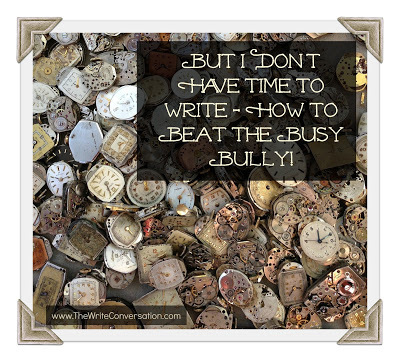 There’s a bully on every block. Even writer’s block. We’ll call him “Busy.” He stands with arms crossed and a scowl on his face, daring us to open our laptops amidst a litany of other tasks that need our attention.
There’s a bully on every block. Even writer’s block. We’ll call him “Busy.” He stands with arms crossed and a scowl on his face, daring us to open our laptops amidst a litany of other tasks that need our attention.
Between working other jobs, parenting, and taking care of the house, Busy Bully squeezes every hour until we don’t have time to write. Just like the scrawny 5th grader who refuses to give up his milk money to the burly 8th grader, we can take back our writing time.Here are three ways we can shut down Busy Bully:
DelegationWe have tasks that must be done, but they don’t all have to be done by us. Often, a teenager or college student will mow the lawn or clean the house inexpensively.
Those of us who are parents love to take care of our families and make sure our kids have everything they need. Between soccer, ballet, and all the other activities, even driving becomes a part-time job.
But consider something else children need: life skills. When we allow them the opportunity to learn to clean their rooms, wash dishes, and other age-appropriate chores, we’re giving them a gift. They’ll grumble at first, but an incentive for chores (e.g., screen time or allowance) should sweeten the deal.
Parents of infants and preschoolers who are sleep deprived often roll their eyes at advice to “get up early or stay up late.” I don’t blame them! If writing first thing is the last thing you need, try swapping childcare with a friend or finding a Mom’s day out program. Choose a productive time of day and enjoy a guilt-free writing session.
 Creative bursts come occasionally, but most
Creative bursts come occasionally, but most
productivity depends on a regular routine.ScheduleWhether we need babysitting arrangements or not, usually we won’t write unless we schedule a specific time.
If we don’t block off a segment of the day for writing, other demands inevitably take over.
Creative bursts come occasionally, but most productivity depends on a regular routine.
Sometimes it’s difficult to get started when I’m not inspired, but if I stick with it more than 20 minutes, I usually get into a groove.
Once I put a writing session on the calendar, I keep the appointment as if I were meeting a client or going to a job. This is a great way to say “no” to invitations or volunteer opportunities you’d rather forgo.
“Sorry, but I have something scheduled that afternoon,” is a polite way to decline and stay on track with your goals. (If it’s too good to pass up, be sure to reschedule a writing session for another time.)
AccountabilitySometimes we have editor-imposed deadlines, but not every writer has an official assignment or other external motivation to produce something. Joining a writers’ group, either locally or online, gives us the extra incentive.
I’ve crashed through many walls with help from my writing cheerleaders. Often, one of us in my critique group sends a group text with a challenge.
Our favorite is “Power Hour.” When we receive the text, we each reply with the hour we’ve chosen to focus on a writing project. The rest of the group prays for us during our intensive work hour and vice versa. We send congratulations when a member completes the challenge. I’m always amazed at what I can accomplish in an hour.
When thinking of challenges, keep it fun! Other ideas include word count challenges (e.g., 1000 words today) or number of blog posts/articles or chapters written in a week. Every group will have unique goals. Facing them together gives you better odds at keeping Busy away.
Busy Bully won’t stand a chance if you hit him with a triple jab—delegation, schedule, and accountability. Stop him cold with those three methods and you’ll own writer’s block.
What are some other methods you use to combat busyness and manage your time? Do you have some fun writing challenges to encourage productivity you’d like to share?
TWEETABLES
Combat the Busy Bullies that appear when you sit down to #write - @LynetaS (Click to Tweet)
But I don't have time to #write - how to beat the busy bullies - @LynetaS (Click to Tweet)
 Lyneta Smith is a Christian writer and speaker who lives near Nashville with her husband in their almost empty nest. When she’s not curled up next to her Boston terrier and tortoise-shell cat, engrossed in writing, she’s out working in her tiny garden or teaching ladies’ Bible study. Her published work can be found in several Chicken Soup for the Soul books, Clubhouse Jr., and many regional newspapers and magazines.
Lyneta Smith is a Christian writer and speaker who lives near Nashville with her husband in their almost empty nest. When she’s not curled up next to her Boston terrier and tortoise-shell cat, engrossed in writing, she’s out working in her tiny garden or teaching ladies’ Bible study. Her published work can be found in several Chicken Soup for the Soul books, Clubhouse Jr., and many regional newspapers and magazines.
Connect with Lyneta on her blog www.lynetasmith.com/blog, Facebook https://www.facebook.com/lyneta.l.smith, and Twitter https://twitter.com/LynetaS.
 There’s a bully on every block. Even writer’s block. We’ll call him “Busy.” He stands with arms crossed and a scowl on his face, daring us to open our laptops amidst a litany of other tasks that need our attention.
There’s a bully on every block. Even writer’s block. We’ll call him “Busy.” He stands with arms crossed and a scowl on his face, daring us to open our laptops amidst a litany of other tasks that need our attention. Between working other jobs, parenting, and taking care of the house, Busy Bully squeezes every hour until we don’t have time to write. Just like the scrawny 5th grader who refuses to give up his milk money to the burly 8th grader, we can take back our writing time.Here are three ways we can shut down Busy Bully:
DelegationWe have tasks that must be done, but they don’t all have to be done by us. Often, a teenager or college student will mow the lawn or clean the house inexpensively.
Those of us who are parents love to take care of our families and make sure our kids have everything they need. Between soccer, ballet, and all the other activities, even driving becomes a part-time job.
But consider something else children need: life skills. When we allow them the opportunity to learn to clean their rooms, wash dishes, and other age-appropriate chores, we’re giving them a gift. They’ll grumble at first, but an incentive for chores (e.g., screen time or allowance) should sweeten the deal.
Parents of infants and preschoolers who are sleep deprived often roll their eyes at advice to “get up early or stay up late.” I don’t blame them! If writing first thing is the last thing you need, try swapping childcare with a friend or finding a Mom’s day out program. Choose a productive time of day and enjoy a guilt-free writing session.
 Creative bursts come occasionally, but most
Creative bursts come occasionally, but most productivity depends on a regular routine.ScheduleWhether we need babysitting arrangements or not, usually we won’t write unless we schedule a specific time.
If we don’t block off a segment of the day for writing, other demands inevitably take over.
Creative bursts come occasionally, but most productivity depends on a regular routine.
Sometimes it’s difficult to get started when I’m not inspired, but if I stick with it more than 20 minutes, I usually get into a groove.
Once I put a writing session on the calendar, I keep the appointment as if I were meeting a client or going to a job. This is a great way to say “no” to invitations or volunteer opportunities you’d rather forgo.
“Sorry, but I have something scheduled that afternoon,” is a polite way to decline and stay on track with your goals. (If it’s too good to pass up, be sure to reschedule a writing session for another time.)
AccountabilitySometimes we have editor-imposed deadlines, but not every writer has an official assignment or other external motivation to produce something. Joining a writers’ group, either locally or online, gives us the extra incentive.
I’ve crashed through many walls with help from my writing cheerleaders. Often, one of us in my critique group sends a group text with a challenge.
Our favorite is “Power Hour.” When we receive the text, we each reply with the hour we’ve chosen to focus on a writing project. The rest of the group prays for us during our intensive work hour and vice versa. We send congratulations when a member completes the challenge. I’m always amazed at what I can accomplish in an hour.
When thinking of challenges, keep it fun! Other ideas include word count challenges (e.g., 1000 words today) or number of blog posts/articles or chapters written in a week. Every group will have unique goals. Facing them together gives you better odds at keeping Busy away.
Busy Bully won’t stand a chance if you hit him with a triple jab—delegation, schedule, and accountability. Stop him cold with those three methods and you’ll own writer’s block.
What are some other methods you use to combat busyness and manage your time? Do you have some fun writing challenges to encourage productivity you’d like to share?
TWEETABLES
Combat the Busy Bullies that appear when you sit down to #write - @LynetaS (Click to Tweet)
But I don't have time to #write - how to beat the busy bullies - @LynetaS (Click to Tweet)
 Lyneta Smith is a Christian writer and speaker who lives near Nashville with her husband in their almost empty nest. When she’s not curled up next to her Boston terrier and tortoise-shell cat, engrossed in writing, she’s out working in her tiny garden or teaching ladies’ Bible study. Her published work can be found in several Chicken Soup for the Soul books, Clubhouse Jr., and many regional newspapers and magazines.
Lyneta Smith is a Christian writer and speaker who lives near Nashville with her husband in their almost empty nest. When she’s not curled up next to her Boston terrier and tortoise-shell cat, engrossed in writing, she’s out working in her tiny garden or teaching ladies’ Bible study. Her published work can be found in several Chicken Soup for the Soul books, Clubhouse Jr., and many regional newspapers and magazines.Connect with Lyneta on her blog www.lynetasmith.com/blog, Facebook https://www.facebook.com/lyneta.l.smith, and Twitter https://twitter.com/LynetaS.
Published on May 04, 2016 01:00
May 3, 2016
The Writer’s Biggest Enemies—Time Thieves
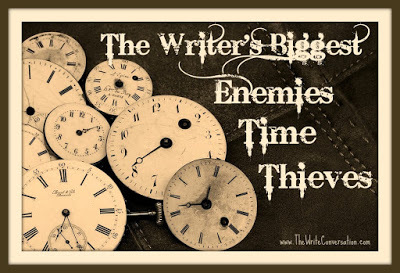 by Edie Melson @EdieMelson
by Edie Melson @EdieMelsonAs writers, one of our most valuable resources is time—especially time to write. We dream about it, plan for it, even run away to find it. Yet it’s often ourselves who stand in the way of having the time we need to write.
Today I’d like to share some hidden—and some not so hidden—time thieves.The Writer’s Biggest Enemies
1. Multi-tasking. This one is a biggie. Yes, we have a lot of things we must do from, writing, to editing, to marketing. But it’s not an efficient use of our time if we try to do everything all at once. By not focusing, we often set ourselves up for failure.
2. Unlimited web-browsing.We definitely need to build an online platform, but spending hours surfing the web isn’t the way to do it.
 3. Not scheduling your time.3. Not scheduling your time.The way to get all the various tasks done that need to be done is by scheduling our time. Find the most creative time and guard it for your writing first. Then work around that time for the other tasks you have to do.
3. Not scheduling your time.3. Not scheduling your time.The way to get all the various tasks done that need to be done is by scheduling our time. Find the most creative time and guard it for your writing first. Then work around that time for the other tasks you have to do.4. Avoiding the hard stuff.It’s only human nature to want to do the easy things first. But that’s not always the most efficient use of our time. Come up with a schedule, then do the tasks that are scheduled, whether they’re hard or easy.
5. Talking instead of working. Writers are like anyone else, we’re passionate about our craft. But we need to make sure we’re spending time practicing our craft, not just talking about it.
 6. Not networking.6. Not networking. We shouldn't spend all our time talking about writing, but that doesn't mean we should isolate ourselves. Others can give us much needed perspective and insight into things we're struggling with.
6. Not networking.6. Not networking. We shouldn't spend all our time talking about writing, but that doesn't mean we should isolate ourselves. Others can give us much needed perspective and insight into things we're struggling with. 7. Using cheating as a reward. It’s great to build in rewards, but make sure the rewards aren’t sabotaging your progress. For example, if I’m on a diet and I lose five pounds, I don’t want to reward myself with a calorie-laden meal. With writing, if I make my word count goal, I want to build on it, not take the rest of the week off.
8. Thinking only about the big dream. Sure we all want to write a blockbuster. But that isn’t my only goal. I have lots of goals that will lead up to that one. Don’t be a big-picture writer and lose out on the chance to fulfill your dream.
9. Over planning.Yes, we need to make plans, and follow a schedule. But if we’re so concerned with the process of planning, we’re wasting valuable time. Write down your goals, come up with a schedule and then GET TO WORK.
10. Not learning.With writers, like most creative endeavors talent is a good start. BUT diligence trumps talent every single time. Doing the hard work to learn all that’s involved with becoming a professional writer will get you much farther than even a huge amount of talent.
These are the biggest time thieves I’ve found. What would you add to the list? Be sure to share your thoughts below.
Don’t forget to join the conversation!Blessings,Edie
TWEETABLESDon’t be your own worst #writing enemy—time thieves towatch out for - @EdieMelson (Click to Tweet)
The Writer’s Biggest Enemies—Time Thieves.@EdieMelson (Click to Tweet)
Published on May 03, 2016 01:00



